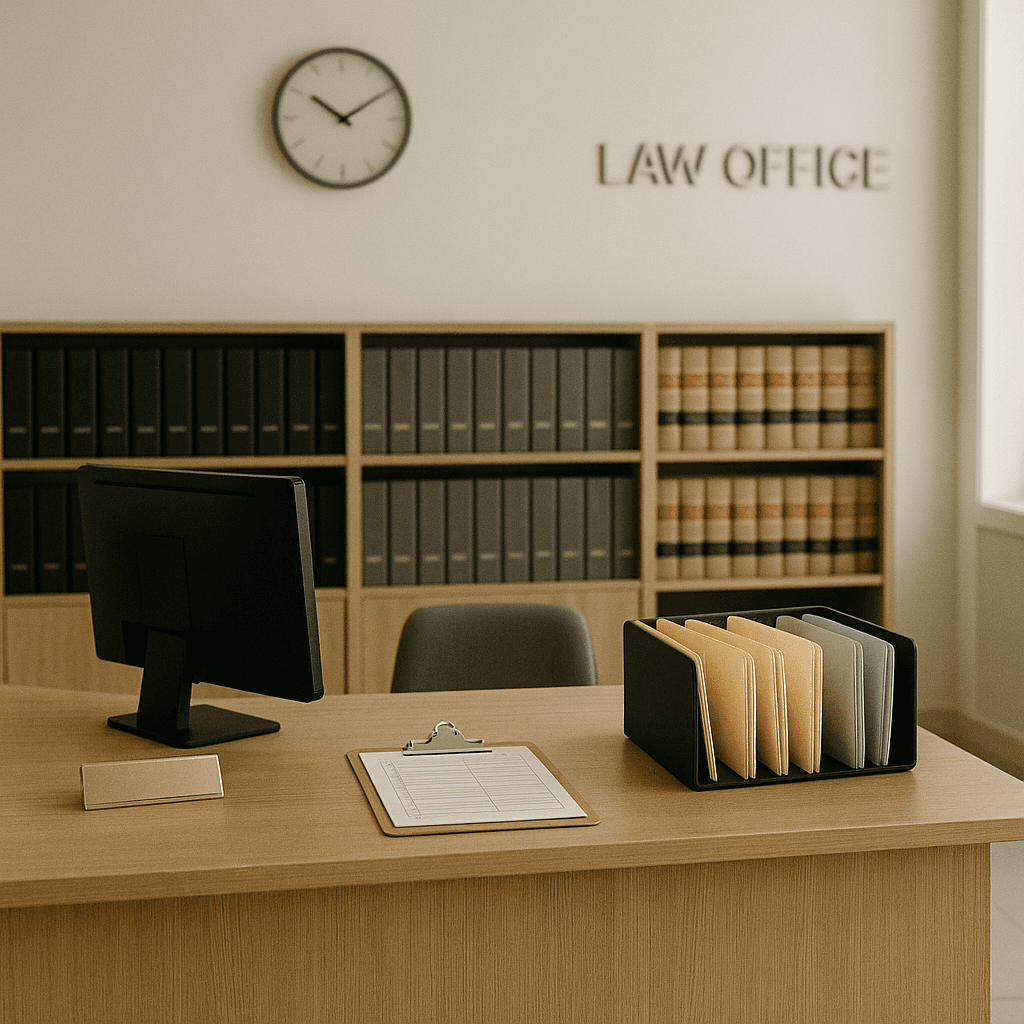Your bills won't wait, but we can help.
Access Funds Before Your Case Settles
Same day funding
No case recovery, no repayment necessary
24/7 availability
No credit checks
Let's Get Started
How it Works
Getting started is simple! Follow these three easy steps:
1

Apply Online
or Call us
2

We Review
Your Case
(Same Day)
3

You Get
Your Cash
(As soon as today!)
Your Financial Relief Starts Here
Rockpoint Legal Funding is your ROCK solid partner providing supportive, fast and honest legal funding with no surprises and Take the first step toward easing your financial burden. With fast, straightforward funding options, we're here to help you access the money you need before your case settles. No more waiting, no hidden fees—just the support you need to move forward with confidence.
< 24 Hrs
From Application to Funding
20,000+
Clients Served
10+
Years in Business
Hablamos Español
Nuestro personal bilingüe está aquí para ayudarte a obtener rápidamente el dinero que necesitas. Llama al (855) 582-9200
What our clients say about us
Take the first step toward easing your financial burden. With fast, straightforward funding options, we’re here to help you access the money you need before your case settles.
4.9
1507+ Google Reviews

"Very patient. Helped me out when no one else could. So grateful."
Shawnna M., Plaintiff

"Rockpoint came through for me when I really needed them the most. The staff is always friendly. It's an easy process. Thanks Rockpoint!"
Renee B., Plaintiff

"Smooth and seamless. I would highly recommend."
Aaron S., Plaintiff

"Amazing service. Transparent and compassionate team that helped me out immensely!"
Tyrone T., Plaintiff

"This company is awesome. I received my funds right into my account the same day. Great service."
Jeanette R., Plaintiff

"The agent that helped me (Natalie) was great, very professional, very welcoming approach, & very attentive; highly recommend if in need of a loan, funding, or advance."
Danny D., Plaintiff

"Great customer service with a very appreciated follow-up call!"
Robert H., Plaintiff

"Amazing professional employees it took 1 day I got the loan great experience highly recommend."
Mika M., Plaintiff

"Rockpoint was the best! My case hasn't settled but I was able to get..."
Latoya E., Plaintiff

"Amazing customer service and efficient payouts. They really help in a pinch and have amazing competitive rates."
Tylyn C., Plaintiff

"They made it easy and painless. My representative was so nice and helpful!"
Erin S., Plaintiff

"I am really thankful for Rockpoint they helped me to get food and to get my car fixed so I won't have to stay inside the house and go crazy."
Alfreda H., Plaintiff

"Very efficient and technologically current with reasonable terms."
James C., Plaintiff

"Great company! They helped me out tremendously and Natalie was very nice. I'd give them 6 stars if I could. Highly recommend."
Steve A., Plaintiff

"Natalie with Rockpoint Legal Funding is a professional in her job and has always been patient, polite and very helpful with all my requests."
Fairy B., Plaintiff

"Very user-friendly, concise and courteous."
Gwendolyn W., Plaintiff

"You guys are the best!!! I highly recommend y'all to anyone and everyone."
Samantha D., Plaintiff

"I was extremely satisfied with the service. I was up to my neck in bills, no income in a year and they really did help."
Robbie H., Plaintiff

"Thank you again Natalie and Antonio for once again helping me, and thank you to the other staff who answers the phone for me with the best assistance and for getting my questions answered and getting my funding to me in the fastest way. I recommend those who are in need go to Rockpoint Legal Funding, they are the best."
Keona S., Plaintiff

"They are miracle workers! Alex at Rockpoint he’s phenomenal, he went above and beyond. I am so happy and appreciate him so much I would recommend them to everybody."
Terrelle N., Plaintiff

"By far best pre-settlement funding company I've come across."
Georgio V., Plaintiff

"Easy and secure. Amazing customer service."
Dante H., Plaintiff

"Rockpoint has been a pleasure to work with. They professionally look at each situation and answer all questions. Natalie was excellent in helping me and verifying everything was correct."
Norman A., Plaintiff

"Was in need for a family emergency, and this company was so quick and efficient on helping us. Definitely great customer service as well, very sincere and willing to do what it takes to help."
Lauro V., Plaintiff

"Their customer service is exceptional, and their services don’t fall short! Thank you Rockpoint!"
Alex G., Plaintiff

"They are the absolute best. Helped me greatly and made the whole process way too easy. Truly appreciate all the help and service."
Josue G., Plaintiff

"Very prompt, kind and helpful, didn't waste no time and made me feel like I was priority customer, would recommend this business to everybody. Very nice staff I didn't have to waste time trying to contact them they contacted me."
Manuel N., Plaintiff

"Absolutely the best service out there, my rep was extremely kind!"
Daniel C., Plaintiff

"Very understanding, never took more than the time they indicated... Thank u all because my situation would be very difficult had they not come thru for me not once but twice."
Larissa M., Plaintiff

"Come in right on time. They are awesome. Can count on them in my time of need."
Michael J., Plaintiff

"They were great with helping me find financial help. Great service great people!"
Erik B., Plaintiff

"They really gave me the help I needed going through the process we all know... such a blessing Rockpoint Legal Funding"
Donald W., Plaintiff

"My experience with Rockpoint was very to the point. Literally. They were very fast and efficient. I would recommend this company to everyone. And the employees were very pleasant to deal with. It was one less headache I had to deal with. Thank you so much with your professionalism."
Mariane S., Plaintiff

"Rockpoint Legal Funding was concerned about my needs. Moreover, they helped me realize my dream in a very professional manner. Thank you, Rockpoint!"
Anna Marie B., Plaintiff

"It was a great experience working with Natalie, she understood my needs and she got to work on my case in no time. Thank you for all your help."
Jorge D., Plaintiff

"Truly lifesavers!!! I want to thank you guys for helping me, I give a big thumbs up!!!"
Samantha D., Plaintiff

"Very understanding and funding was fast definitely would recommend Rockpoint."
Jennifer W., Plaintiff

"I have used Rockpoint twice and both times I dealt with professional customer service that was very fast and efficient! They are very informative on the process and they guide you with ease from start to finish. If you are going through some tough times or last-minute emergencies and are awaiting a settlement, I definitely recommend Rockpoint for all of your financial needs!"
Kia A., Plaintiff

"Rockpoint saved me in a desperate time of need! I will always be grateful to Rockpoint for helping me when I had nowhere else to turn."
Ericka G., Plaintiff

"Rockpoint Legal Funding is very good fast and thorough. All representatives are very pleasant and polite I would definitely recommend Rockpoint."
Bobby B., Plaintiff

"It was quick & easy! If you are in a hardship like I was, then please give them a try. You will not be disappointed with their friendly services & prompt responses."
Carol H., Plaintiff

"Thank you Rockpoint, without you my life would be impossible to manage. You're the best!"
Dane C., Plaintiff

"The process was smooth, quick, and easy, and the team has great communication. During a stressful time, this company gave me ease, respect, and swiftness, to which I am very grateful!"
Tallulah K., Plaintiff

"Rockpoint Legal Funding has been a life saver for me. They approved my funding for $25,000 in less than 24 hours, and I received my money direct deposit in about 15 minutes once my application was approved. Very professional! I will definitely do business with them again."
Debra K., Plaintiff

"Very professional. They listened to my concerns and made the process effortless."
Deborah P., Plaintiff

"The whole process was super smooth and easy and super fast."
Carmen G., Plaintiff

"Rockpoint was there when I needed extra funds on short notice while waiting for a settlement on my case. They were responsive and checked in on me before and after finding my loan request. I will forever recommend Rockpoint, as they are reliable, professional, and just a great organization with a team who truly cares. Thank you Rockpoint!"
Marcia J., Plaintiff

"Help me out in a time that I had nothing they are a blessing thank you Rockpoint"
Christina G., Plaintiff

"Rockpoint made it all possible. The funding was easy and immediate. Now I can continue receiving the proper medical treatments and I can get the right amount due for my case. Everyone at Rockpoint Legal Funding that I have had the pleasure of meeting has been very friendly, knowledgeable, and highly efficient. Thank you Rockpoint Legal Funding!"
Bryan G., Plaintiff

"Grat experience overall. Would recomend it to anybody who needs fast financial help."
Melvin A., Plaintiff

"Great fast and friendly service. Really appreciate the help. Thanks"
Sonya S., Plaintiff

"Rockpoint Legal Funding helped me with a pre-settlement loan that came right on time. I was able to buy all new furniture and move to my new home with no stress. Thanks Rockpoint."
Yvonne L., Plaintiff

"The funding came in a timely matter during times of distress. I recommend this service from Rockpoint."
Timothy M., Plaintiff

"They provided great customer service and were very quick and diligent. Very grateful for the service offered and the quality of service given."
Gabriela J., Plaintiff

"They make sure everything is perfect, and above all, they help you super fast and safely and very professionally. I definitely recommend Rockpoint Legal Funding!"
Patty G., Plaintiff

"They have been there for me on a few occasions since I was hit by an Uber driver on my bicycle and fractured my left hip. Great company from top to bottom, customer service and all."
Rorie K., Plaintiff

"Needed the money and it was there within a day! Thanks Rockpoint!"
Kevin M., Plaintiff

"I wanna thank this company for giving me hope for the future. Hope is so necessary during these crazy times, thanks Natalie."
Kenneth A., Plaintiff

"They were very quick with helping me. Great communication!"
Alize S., Plaintiff

"Asked for services and was provided with the best services by far yet. Thank you Rockpoint Legal Funding."
James C., Plaintiff

"I worked with Natalie at Rockpoint Legal Funding she was so informative and provided outstanding customer service! I appreciate the fact that she was able to answer all of my questions and go over everything with me. She gave above and beyond service!"
Lashayla G., Plaintiff

"Natalie was amazing and this was very easy!! Thank you so much!!!"
Victoria M., Plaintiff

"Extremely helpful employees! I wasn’t expecting anyone to go above and beyond for a loan applicant but they did and I was very surprised."
Eugene R., Plaintiff

"Honest, trustworthy people. I recommend Rockpoint Legal Funding. They helped me in my difficult times, no questions asked."
Frank E., Plaintiff

"After the request was submitted and reviewed the funds were delivered by FedEx the very next day. Very easy to work with and fast funding."
Myron M., Plaintiff

"This was my first experience with Rockpoint you guys handle my matter in such a professional and quick response you have no idea how you guys help me thank you so much and I hope everybody out there who gets a chance to experience you guys will know how great you guys are again thank you so much."
Tyler W., Plaintiff

"Thank you Rockpoint for helping me through the tough times I went through after my accident."
Mike D., Plaintiff

"Always there to help. Been using Rockpoint on and off for 3 years and I don’t know what I would do without them!"
Lindsay S., Plaintiff

"Once again Rockpoint has come through with very fast, easy and professional service. Highly recommend if in need of assistance!"
Keandre G., Plaintiff

"Quick! The agent was attentive and compassionate. I highly recommend."
Danielle W., Plaintiff

"Very professional! My experience was excellent, really appreciate the communication and follow-up!"
Claire G., Plaintiff

"They have been very helpful to those in need and they don't have you waiting long for the underwriter to review and sign for funding. Rockpoint also has great staff that is very friendly and helpful. I would recommend anyone in need to try Rockpoint."
Deidre W., Plaintiff

"Rockpoint Legal Funding is awesome to work with and helped my family and I out greatly. The rep that helped me was so nice and friendly and the whole process was simple and easy to complete. I would recommend Rockpoint to anyone."
Adrian S., Plaintiff

"Rockpoint has literally saved my life, my home, my car, my future from complete disappointment and disaster! Alex was so wonderful to work with. He was very kind, supportive and compassionate during the whole process. Everyone was so kind during my daily calls. I'm so VERY Grateful for Shaun Bauman & Maria at Bauman Law for recommending Rockpoint."
Stacey M., Plaintiff

"Saul was very helpful and kind. Very great customer service."
Charlene R., Plaintiff

"My experience was awesome. Very fast and efficient. Rockpoint customer service is the best."
Amannda E., Plaintiff

"Words cannot explain how thankful i am to have Rockpoint Legal Funding on my side helping me financially through this trying time in my life. I was hurt in a accident last year which caused me to have to go on disability my life has been in shambles ever since then times have been harder than ever for me I have to get a surgery to fix my body i am not able to work to support myself as of now compared to usually working 7 days a week prior to my disability thank God my Lawyers sent me to you guys because it's Christmas an I have no money at all they take my car in 10 days if i don't pay and my rent is due tomarrow an I have no income in America as of now I'm going nuts inside Im actually quite scared at this moment in life to be honest i caint take living this way anymore. Thank God for Rockpoint Legal Funding"
Brittonya B., Plaintiff

"Excellent services from Rockpoint and Saul guided me thru all screens he is professional."
Gracie H., Plaintiff

"Great rates. Got my money on time without any hassle."
Keith M., Plaintiff

"Quick, efficient, and very accommodating."
Deamus W., Plaintiff

"Pleasent to deal with and quick deposit into my account. Terms are fair. Highly recommend!!!"
Mark M., Plaintiff

"I needed help with my expenses after a bad car accident, and Rockpoint took care of me!"
William M., Plaintiff

"I had a serious accident at work. I needed critical funds to stay a float. Natalie at Rockpoint came through with those funds when I needed them most. Thank you Rockpoint ❤️ for the GREAT SERVICE and doing what U do!!!"
Michael M., Plaintiff

"Rockpoint helped me with all my needs. I highly recommend them!"
Anthony A., Plaintiff

"The turn around time is on point as well as their client service. Won’t know where I would be if not for Rockpoint Legal Funding"
Velton H., Plaintiff

"Rockpoint is absolutely awesome. They helped me so much an I would refer them to anybody. There staff are the best ever an I mean the best. They get back to u right away."
Debbie M., Plaintiff

"The service was fast and easy and the customer service was excellent. Thank you for your kindness and your support during this hardship."
Lalonnie M., Plaintiff

"Simply the best in professionalism and friendliness. Always ready to help! Thank you all for helping us out in our time of great need!"
Miguel D., Plaintiff

"Couldn’t believe within 3 hours the money was in my account! Literally life-saving! Super easy, no hassle and right on time. I am very thankful this was available."
Christine N., Plaintiff

"Natalie was amazing, she answered every question I had! Her communication is 100%!"
Cynthia A., Plaintiff

"Efficient and timely - first time user of legal funding and Rockpoint processed and issued funding to me within 24 hours, which I received within 48 hours of submitting my application. They kept in contact with me via phone, text and email throughout the whole process. I'm very pleased with my experience with Rockpoint."
Craig C., Plaintiff

"The agent that I had was Amazing. Very fast working. And extremely attentive. She vas supper kind and had great customer service. Thank you."
Kiah E., Plaintiff

"Simply put we got help we badly needed and it was fast!!!"
Amanda H., Plaintiff

"Definitely recommend Rockpoint. They come through in the time of need. They work fast and if you have any issues they are there to help. 10/5 stars!"
Griselda R., Plaintiff

"They helped me!!! Everything was easy, fast and professional!!! 100% recommend"
Abel L., Plaintiff

"The best out there. I found them to be decisively fair and fast to my funding request."
Jeffrey A., Plaintiff

"What a super easy process, it was easier than starting a new email account. The banker that assisted me from beginning to end was fantastic! All my questions and concerns were addressed and I felt confident in what I was doing with my loan and that there will be no surprises along the way because of the way everything was explained to me in simple terms. Thanks again!!"
Steven B., Plaintiff

"They helped me when I was in a bad place and they were a pleasure to talk to, very friendly, helpful and fast. I highly recommend Rockpoint Legal Funding."
April M., Plaintiff

"Natalie was very on point and the process was complete within 4 hours! Rockpoint gets it done! Thank you."
Rakel T., Plaintiff

"Professional and superb customer service. I was delighted with expeditious service and excellent communication. Natalie was always available to answer my questions and I seldom waited more than an hour for any response needed. Their rates are extremely competitive and I’m very grateful for their assistance."
Wendy V., Plaintiff

"My business with Rockpoint was seamless, easy, quick and quite helpful. They helped me out in a spot of dire need. I couldn’t suggest their service with anything but the highest regard."
Kevin F., Plaintiff

"I'm a happy customer. Employees are respectful and kind, great company to deal with. I would recommend them to my family and friends."
Donna K., Plaintiff

"These people are amazing, I got my money the same day. I wouldn't choose anybody else."
Beverley B., Plaintiff

"Excellent company! I'm a camp fire survivor, still waiting for a full pay out and struggling. The whole process took no more than 24 hours. Seems like I blinked and the money was in my bank."
Shanna H., Plaintiff

"Rockpoint Legal Funding came through with sending money that I was in need of. Call them if you are in a legal bind..."
Damon C., Plaintiff

"The representative that I had stayed on the phone with me to make sure that I didn't have any problems. She called me back several times to check on me and also helped as much as possible so that I understood the process. Then she called back to provide me with a tracking number. I am very pleased with my customer service experience. I don't remember her name because I was so busy but wanted her to know that I appreciate everything and she definitely needs a raise or promotion. Thank you again!!"
Camillia B., Plaintiff

"Natalie was great, quick & easy... I appreciate your help Rockpoint!!!"
Vincent G., Plaintiff

"The very best service that you could have!!! I'm so very grateful to you folks you've helped me through so many times. Always professional and very helpful. I would recommend to everyone that I know and those that I don't to use your services. You can't go wrong."
Donna M., Plaintiff

"Fast, friendly and efficient. I had a great experience and I'm happy they were able to help in my time of need!"
Christie V., Plaintiff

"Rockpoint Legal Funding helped me when I needed it most! They made it so easy to apply and I was approved right away. They gave me options on how to get my money and by the next day money was in my bank. Thank you to Rockpoint Legal Funding!!"
Lydia C., Plaintiff

"From start to finish the customer service speed and thoroughness was positive and lightening fast! Thank you everyone at Rockpoint!"
Julia Z., Plaintiff

"Very satisfied, helped me tremendously. The best service received. Will recommend to the world, thank you!"
Christina C., Plaintiff

"I want to thank Natalie she helped me so much. It is very helpful and very affirmative"
Lillian J., Plaintiff

"Fast clear experience. Beyond grateful for the support and positive experience!"
Sophia J., Plaintiff

"Friendly fast service. Company is very easy to work with. Definitely recommended!"
Joy B., Plaintiff

"Rockpoint Legal Funding has been a tremendous help through my trials and tribulation. I just wanna say I’m grateful!"
Cas M., Plaintiff

"Very professional. They were quick to respond to my needs. I rate them a 100%."
Pamela E., Plaintiff

"Quick, easy and friendly"
Luz P., Plaintiff

"I wish I could give more than 5 stars, they've helped not only once but 3 times. Thank you for everything!"
Asha G., Plaintiff

"Very patient. Helped me out when no one else could. So grateful."
Shawnna M., Plaintiff

"Rockpoint came through for me when I really needed them the most. The staff is always friendly. It's an easy process. Thanks Rockpoint!"
Renee B., Plaintiff

"Smooth and seamless. I would highly recommend."
Aaron S., Plaintiff

"Amazing service. Transparent and compassionate team that helped me out immensely!"
Tyrone T., Plaintiff

"This company is awesome. I received my funds right into my account the same day. Great service."
Jeanette R., Plaintiff

"The agent that helped me (Natalie) was great, very professional, very welcoming approach, & very attentive; highly recommend if in need of a loan, funding, or advance."
Danny D., Plaintiff

"Great customer service with a very appreciated follow-up call!"
Robert H., Plaintiff

"Amazing professional employees it took 1 day I got the loan great experience highly recommend."
Mika M., Plaintiff

"Rockpoint was the best! My case hasn't settled but I was able to get..."
Latoya E., Plaintiff

"Amazing customer service and efficient payouts. They really help in a pinch and have amazing competitive rates."
Tylyn C., Plaintiff

"They made it easy and painless. My representative was so nice and helpful!"
Erin S., Plaintiff

"I am really thankful for Rockpoint they helped me to get food and to get my car fixed so I won't have to stay inside the house and go crazy."
Alfreda H., Plaintiff

"Very efficient and technologically current with reasonable terms."
James C., Plaintiff

"Great company! They helped me out tremendously and Natalie was very nice. I'd give them 6 stars if I could. Highly recommend."
Steve A., Plaintiff

"Natalie with Rockpoint Legal Funding is a professional in her job and has always been patient, polite and very helpful with all my requests."
Fairy B., Plaintiff

"Very user-friendly, concise and courteous."
Gwendolyn W., Plaintiff

"You guys are the best!!! I highly recommend y'all to anyone and everyone."
Samantha D., Plaintiff

"I was extremely satisfied with the service. I was up to my neck in bills, no income in a year and they really did help."
Robbie H., Plaintiff

"Thank you again Natalie and Antonio for once again helping me, and thank you to the other staff who answers the phone for me with the best assistance and for getting my questions answered and getting my funding to me in the fastest way. I recommend those who are in need go to Rockpoint Legal Funding, they are the best."
Keona S., Plaintiff

"They are miracle workers! Alex at Rockpoint he’s phenomenal, he went above and beyond. I am so happy and appreciate him so much I would recommend them to everybody."
Terrelle N., Plaintiff

"By far best pre-settlement funding company I've come across."
Georgio V., Plaintiff

"Easy and secure. Amazing customer service."
Dante H., Plaintiff

"Rockpoint has been a pleasure to work with. They professionally look at each situation and answer all questions. Natalie was excellent in helping me and verifying everything was correct."
Norman A., Plaintiff

"Was in need for a family emergency, and this company was so quick and efficient on helping us. Definitely great customer service as well, very sincere and willing to do what it takes to help."
Lauro V., Plaintiff

"Their customer service is exceptional, and their services don’t fall short! Thank you Rockpoint!"
Alex G., Plaintiff

"They are the absolute best. Helped me greatly and made the whole process way too easy. Truly appreciate all the help and service."
Josue G., Plaintiff

"Very prompt, kind and helpful, didn't waste no time and made me feel like I was priority customer, would recommend this business to everybody. Very nice staff I didn't have to waste time trying to contact them they contacted me."
Manuel N., Plaintiff

"Absolutely the best service out there, my rep was extremely kind!"
Daniel C., Plaintiff

"Very understanding, never took more than the time they indicated... Thank u all because my situation would be very difficult had they not come thru for me not once but twice."
Larissa M., Plaintiff

"Come in right on time. They are awesome. Can count on them in my time of need."
Michael J., Plaintiff

"They were great with helping me find financial help. Great service great people!"
Erik B., Plaintiff

"They really gave me the help I needed going through the process we all know... such a blessing Rockpoint Legal Funding"
Donald W., Plaintiff

"My experience with Rockpoint was very to the point. Literally. They were very fast and efficient. I would recommend this company to everyone. And the employees were very pleasant to deal with. It was one less headache I had to deal with. Thank you so much with your professionalism."
Mariane S., Plaintiff

"Rockpoint Legal Funding was concerned about my needs. Moreover, they helped me realize my dream in a very professional manner. Thank you, Rockpoint!"
Anna Marie B., Plaintiff

"It was a great experience working with Natalie, she understood my needs and she got to work on my case in no time. Thank you for all your help."
Jorge D., Plaintiff

"Truly lifesavers!!! I want to thank you guys for helping me, I give a big thumbs up!!!"
Samantha D., Plaintiff

"Very understanding and funding was fast definitely would recommend Rockpoint."
Jennifer W., Plaintiff

"I have used Rockpoint twice and both times I dealt with professional customer service that was very fast and efficient! They are very informative on the process and they guide you with ease from start to finish. If you are going through some tough times or last-minute emergencies and are awaiting a settlement, I definitely recommend Rockpoint for all of your financial needs!"
Kia A., Plaintiff

"Rockpoint saved me in a desperate time of need! I will always be grateful to Rockpoint for helping me when I had nowhere else to turn."
Ericka G., Plaintiff

"Rockpoint Legal Funding is very good fast and thorough. All representatives are very pleasant and polite I would definitely recommend Rockpoint."
Bobby B., Plaintiff

"It was quick & easy! If you are in a hardship like I was, then please give them a try. You will not be disappointed with their friendly services & prompt responses."
Carol H., Plaintiff

"Thank you Rockpoint, without you my life would be impossible to manage. You're the best!"
Dane C., Plaintiff

"The process was smooth, quick, and easy, and the team has great communication. During a stressful time, this company gave me ease, respect, and swiftness, to which I am very grateful!"
Tallulah K., Plaintiff

"Rockpoint Legal Funding has been a life saver for me. They approved my funding for $25,000 in less than 24 hours, and I received my money direct deposit in about 15 minutes once my application was approved. Very professional! I will definitely do business with them again."
Debra K., Plaintiff

"Very professional. They listened to my concerns and made the process effortless."
Deborah P., Plaintiff

"The whole process was super smooth and easy and super fast."
Carmen G., Plaintiff

"Rockpoint was there when I needed extra funds on short notice while waiting for a settlement on my case. They were responsive and checked in on me before and after finding my loan request. I will forever recommend Rockpoint, as they are reliable, professional, and just a great organization with a team who truly cares. Thank you Rockpoint!"
Marcia J., Plaintiff

"Help me out in a time that I had nothing they are a blessing thank you Rockpoint"
Christina G., Plaintiff

"Rockpoint made it all possible. The funding was easy and immediate. Now I can continue receiving the proper medical treatments and I can get the right amount due for my case. Everyone at Rockpoint Legal Funding that I have had the pleasure of meeting has been very friendly, knowledgeable, and highly efficient. Thank you Rockpoint Legal Funding!"
Bryan G., Plaintiff

"Grat experience overall. Would recomend it to anybody who needs fast financial help."
Melvin A., Plaintiff

"Great fast and friendly service. Really appreciate the help. Thanks"
Sonya S., Plaintiff

"Rockpoint Legal Funding helped me with a pre-settlement loan that came right on time. I was able to buy all new furniture and move to my new home with no stress. Thanks Rockpoint."
Yvonne L., Plaintiff

"The funding came in a timely matter during times of distress. I recommend this service from Rockpoint."
Timothy M., Plaintiff

"They provided great customer service and were very quick and diligent. Very grateful for the service offered and the quality of service given."
Gabriela J., Plaintiff

"They make sure everything is perfect, and above all, they help you super fast and safely and very professionally. I definitely recommend Rockpoint Legal Funding!"
Patty G., Plaintiff

"They have been there for me on a few occasions since I was hit by an Uber driver on my bicycle and fractured my left hip. Great company from top to bottom, customer service and all."
Rorie K., Plaintiff

"Needed the money and it was there within a day! Thanks Rockpoint!"
Kevin M., Plaintiff

"I wanna thank this company for giving me hope for the future. Hope is so necessary during these crazy times, thanks Natalie."
Kenneth A., Plaintiff

"They were very quick with helping me. Great communication!"
Alize S., Plaintiff

"Asked for services and was provided with the best services by far yet. Thank you Rockpoint Legal Funding."
James C., Plaintiff

"I worked with Natalie at Rockpoint Legal Funding she was so informative and provided outstanding customer service! I appreciate the fact that she was able to answer all of my questions and go over everything with me. She gave above and beyond service!"
Lashayla G., Plaintiff

"Natalie was amazing and this was very easy!! Thank you so much!!!"
Victoria M., Plaintiff

"Extremely helpful employees! I wasn’t expecting anyone to go above and beyond for a loan applicant but they did and I was very surprised."
Eugene R., Plaintiff

"Honest, trustworthy people. I recommend Rockpoint Legal Funding. They helped me in my difficult times, no questions asked."
Frank E., Plaintiff

"After the request was submitted and reviewed the funds were delivered by FedEx the very next day. Very easy to work with and fast funding."
Myron M., Plaintiff

"This was my first experience with Rockpoint you guys handle my matter in such a professional and quick response you have no idea how you guys help me thank you so much and I hope everybody out there who gets a chance to experience you guys will know how great you guys are again thank you so much."
Tyler W., Plaintiff

"Thank you Rockpoint for helping me through the tough times I went through after my accident."
Mike D., Plaintiff

"Always there to help. Been using Rockpoint on and off for 3 years and I don’t know what I would do without them!"
Lindsay S., Plaintiff

"Once again Rockpoint has come through with very fast, easy and professional service. Highly recommend if in need of assistance!"
Keandre G., Plaintiff

"Quick! The agent was attentive and compassionate. I highly recommend."
Danielle W., Plaintiff

"Very professional! My experience was excellent, really appreciate the communication and follow-up!"
Claire G., Plaintiff

"They have been very helpful to those in need and they don't have you waiting long for the underwriter to review and sign for funding. Rockpoint also has great staff that is very friendly and helpful. I would recommend anyone in need to try Rockpoint."
Deidre W., Plaintiff

"Rockpoint Legal Funding is awesome to work with and helped my family and I out greatly. The rep that helped me was so nice and friendly and the whole process was simple and easy to complete. I would recommend Rockpoint to anyone."
Adrian S., Plaintiff

"Rockpoint has literally saved my life, my home, my car, my future from complete disappointment and disaster! Alex was so wonderful to work with. He was very kind, supportive and compassionate during the whole process. Everyone was so kind during my daily calls. I'm so VERY Grateful for Shaun Bauman & Maria at Bauman Law for recommending Rockpoint."
Stacey M., Plaintiff

"Saul was very helpful and kind. Very great customer service."
Charlene R., Plaintiff

"My experience was awesome. Very fast and efficient. Rockpoint customer service is the best."
Amannda E., Plaintiff

"Words cannot explain how thankful i am to have Rockpoint Legal Funding on my side helping me financially through this trying time in my life. I was hurt in a accident last year which caused me to have to go on disability my life has been in shambles ever since then times have been harder than ever for me I have to get a surgery to fix my body i am not able to work to support myself as of now compared to usually working 7 days a week prior to my disability thank God my Lawyers sent me to you guys because it's Christmas an I have no money at all they take my car in 10 days if i don't pay and my rent is due tomarrow an I have no income in America as of now I'm going nuts inside Im actually quite scared at this moment in life to be honest i caint take living this way anymore. Thank God for Rockpoint Legal Funding"
Brittonya B., Plaintiff

"Excellent services from Rockpoint and Saul guided me thru all screens he is professional."
Gracie H., Plaintiff

"Great rates. Got my money on time without any hassle."
Keith M., Plaintiff

"Quick, efficient, and very accommodating."
Deamus W., Plaintiff

"Pleasent to deal with and quick deposit into my account. Terms are fair. Highly recommend!!!"
Mark M., Plaintiff

"I needed help with my expenses after a bad car accident, and Rockpoint took care of me!"
William M., Plaintiff

"I had a serious accident at work. I needed critical funds to stay a float. Natalie at Rockpoint came through with those funds when I needed them most. Thank you Rockpoint ❤️ for the GREAT SERVICE and doing what U do!!!"
Michael M., Plaintiff

"Rockpoint helped me with all my needs. I highly recommend them!"
Anthony A., Plaintiff

"The turn around time is on point as well as their client service. Won’t know where I would be if not for Rockpoint Legal Funding"
Velton H., Plaintiff

"Rockpoint is absolutely awesome. They helped me so much an I would refer them to anybody. There staff are the best ever an I mean the best. They get back to u right away."
Debbie M., Plaintiff

"The service was fast and easy and the customer service was excellent. Thank you for your kindness and your support during this hardship."
Lalonnie M., Plaintiff

"Simply the best in professionalism and friendliness. Always ready to help! Thank you all for helping us out in our time of great need!"
Miguel D., Plaintiff

"Couldn’t believe within 3 hours the money was in my account! Literally life-saving! Super easy, no hassle and right on time. I am very thankful this was available."
Christine N., Plaintiff

"Natalie was amazing, she answered every question I had! Her communication is 100%!"
Cynthia A., Plaintiff

"Efficient and timely - first time user of legal funding and Rockpoint processed and issued funding to me within 24 hours, which I received within 48 hours of submitting my application. They kept in contact with me via phone, text and email throughout the whole process. I'm very pleased with my experience with Rockpoint."
Craig C., Plaintiff

"The agent that I had was Amazing. Very fast working. And extremely attentive. She vas supper kind and had great customer service. Thank you."
Kiah E., Plaintiff

"Simply put we got help we badly needed and it was fast!!!"
Amanda H., Plaintiff

"Definitely recommend Rockpoint. They come through in the time of need. They work fast and if you have any issues they are there to help. 10/5 stars!"
Griselda R., Plaintiff

"They helped me!!! Everything was easy, fast and professional!!! 100% recommend"
Abel L., Plaintiff

"The best out there. I found them to be decisively fair and fast to my funding request."
Jeffrey A., Plaintiff

"What a super easy process, it was easier than starting a new email account. The banker that assisted me from beginning to end was fantastic! All my questions and concerns were addressed and I felt confident in what I was doing with my loan and that there will be no surprises along the way because of the way everything was explained to me in simple terms. Thanks again!!"
Steven B., Plaintiff

"They helped me when I was in a bad place and they were a pleasure to talk to, very friendly, helpful and fast. I highly recommend Rockpoint Legal Funding."
April M., Plaintiff

"Natalie was very on point and the process was complete within 4 hours! Rockpoint gets it done! Thank you."
Rakel T., Plaintiff

"Professional and superb customer service. I was delighted with expeditious service and excellent communication. Natalie was always available to answer my questions and I seldom waited more than an hour for any response needed. Their rates are extremely competitive and I’m very grateful for their assistance."
Wendy V., Plaintiff

"My business with Rockpoint was seamless, easy, quick and quite helpful. They helped me out in a spot of dire need. I couldn’t suggest their service with anything but the highest regard."
Kevin F., Plaintiff

"I'm a happy customer. Employees are respectful and kind, great company to deal with. I would recommend them to my family and friends."
Donna K., Plaintiff

"These people are amazing, I got my money the same day. I wouldn't choose anybody else."
Beverley B., Plaintiff

"Excellent company! I'm a camp fire survivor, still waiting for a full pay out and struggling. The whole process took no more than 24 hours. Seems like I blinked and the money was in my bank."
Shanna H., Plaintiff

"Rockpoint Legal Funding came through with sending money that I was in need of. Call them if you are in a legal bind..."
Damon C., Plaintiff

"The representative that I had stayed on the phone with me to make sure that I didn't have any problems. She called me back several times to check on me and also helped as much as possible so that I understood the process. Then she called back to provide me with a tracking number. I am very pleased with my customer service experience. I don't remember her name because I was so busy but wanted her to know that I appreciate everything and she definitely needs a raise or promotion. Thank you again!!"
Camillia B., Plaintiff

"Natalie was great, quick & easy... I appreciate your help Rockpoint!!!"
Vincent G., Plaintiff

"The very best service that you could have!!! I'm so very grateful to you folks you've helped me through so many times. Always professional and very helpful. I would recommend to everyone that I know and those that I don't to use your services. You can't go wrong."
Donna M., Plaintiff

"Fast, friendly and efficient. I had a great experience and I'm happy they were able to help in my time of need!"
Christie V., Plaintiff

"Rockpoint Legal Funding helped me when I needed it most! They made it so easy to apply and I was approved right away. They gave me options on how to get my money and by the next day money was in my bank. Thank you to Rockpoint Legal Funding!!"
Lydia C., Plaintiff

"From start to finish the customer service speed and thoroughness was positive and lightening fast! Thank you everyone at Rockpoint!"
Julia Z., Plaintiff

"Very satisfied, helped me tremendously. The best service received. Will recommend to the world, thank you!"
Christina C., Plaintiff

"I want to thank Natalie she helped me so much. It is very helpful and very affirmative"
Lillian J., Plaintiff

"Fast clear experience. Beyond grateful for the support and positive experience!"
Sophia J., Plaintiff

"Friendly fast service. Company is very easy to work with. Definitely recommended!"
Joy B., Plaintiff

"Rockpoint Legal Funding has been a tremendous help through my trials and tribulation. I just wanna say I’m grateful!"
Cas M., Plaintiff

"Very professional. They were quick to respond to my needs. I rate them a 100%."
Pamela E., Plaintiff

"Quick, easy and friendly"
Luz P., Plaintiff

"I wish I could give more than 5 stars, they've helped not only once but 3 times. Thank you for everything!"
Asha G., Plaintiff

"Very patient. Helped me out when no one else could. So grateful."
Shawnna M., Plaintiff

"Rockpoint came through for me when I really needed them the most. The staff is always friendly. It's an easy process. Thanks Rockpoint!"
Renee B., Plaintiff

"Smooth and seamless. I would highly recommend."
Aaron S., Plaintiff

"Amazing service. Transparent and compassionate team that helped me out immensely!"
Tyrone T., Plaintiff

"This company is awesome. I received my funds right into my account the same day. Great service."
Jeanette R., Plaintiff

"The agent that helped me (Natalie) was great, very professional, very welcoming approach, & very attentive; highly recommend if in need of a loan, funding, or advance."
Danny D., Plaintiff

"Great customer service with a very appreciated follow-up call!"
Robert H., Plaintiff

"Amazing professional employees it took 1 day I got the loan great experience highly recommend."
Mika M., Plaintiff

"Rockpoint was the best! My case hasn't settled but I was able to get..."
Latoya E., Plaintiff

"Amazing customer service and efficient payouts. They really help in a pinch and have amazing competitive rates."
Tylyn C., Plaintiff

"They made it easy and painless. My representative was so nice and helpful!"
Erin S., Plaintiff

"I am really thankful for Rockpoint they helped me to get food and to get my car fixed so I won't have to stay inside the house and go crazy."
Alfreda H., Plaintiff

"Very efficient and technologically current with reasonable terms."
James C., Plaintiff

"Great company! They helped me out tremendously and Natalie was very nice. I'd give them 6 stars if I could. Highly recommend."
Steve A., Plaintiff

"Natalie with Rockpoint Legal Funding is a professional in her job and has always been patient, polite and very helpful with all my requests."
Fairy B., Plaintiff

"Very user-friendly, concise and courteous."
Gwendolyn W., Plaintiff

"You guys are the best!!! I highly recommend y'all to anyone and everyone."
Samantha D., Plaintiff

"I was extremely satisfied with the service. I was up to my neck in bills, no income in a year and they really did help."
Robbie H., Plaintiff

"Thank you again Natalie and Antonio for once again helping me, and thank you to the other staff who answers the phone for me with the best assistance and for getting my questions answered and getting my funding to me in the fastest way. I recommend those who are in need go to Rockpoint Legal Funding, they are the best."
Keona S., Plaintiff

"They are miracle workers! Alex at Rockpoint he’s phenomenal, he went above and beyond. I am so happy and appreciate him so much I would recommend them to everybody."
Terrelle N., Plaintiff

"By far best pre-settlement funding company I've come across."
Georgio V., Plaintiff

"Easy and secure. Amazing customer service."
Dante H., Plaintiff

"Rockpoint has been a pleasure to work with. They professionally look at each situation and answer all questions. Natalie was excellent in helping me and verifying everything was correct."
Norman A., Plaintiff

"Was in need for a family emergency, and this company was so quick and efficient on helping us. Definitely great customer service as well, very sincere and willing to do what it takes to help."
Lauro V., Plaintiff

"Their customer service is exceptional, and their services don’t fall short! Thank you Rockpoint!"
Alex G., Plaintiff

"They are the absolute best. Helped me greatly and made the whole process way too easy. Truly appreciate all the help and service."
Josue G., Plaintiff

"Very prompt, kind and helpful, didn't waste no time and made me feel like I was priority customer, would recommend this business to everybody. Very nice staff I didn't have to waste time trying to contact them they contacted me."
Manuel N., Plaintiff

"Absolutely the best service out there, my rep was extremely kind!"
Daniel C., Plaintiff

"Very understanding, never took more than the time they indicated... Thank u all because my situation would be very difficult had they not come thru for me not once but twice."
Larissa M., Plaintiff

"Come in right on time. They are awesome. Can count on them in my time of need."
Michael J., Plaintiff

"They were great with helping me find financial help. Great service great people!"
Erik B., Plaintiff

"They really gave me the help I needed going through the process we all know... such a blessing Rockpoint Legal Funding"
Donald W., Plaintiff

"My experience with Rockpoint was very to the point. Literally. They were very fast and efficient. I would recommend this company to everyone. And the employees were very pleasant to deal with. It was one less headache I had to deal with. Thank you so much with your professionalism."
Mariane S., Plaintiff

"Rockpoint Legal Funding was concerned about my needs. Moreover, they helped me realize my dream in a very professional manner. Thank you, Rockpoint!"
Anna Marie B., Plaintiff

"It was a great experience working with Natalie, she understood my needs and she got to work on my case in no time. Thank you for all your help."
Jorge D., Plaintiff

"Truly lifesavers!!! I want to thank you guys for helping me, I give a big thumbs up!!!"
Samantha D., Plaintiff

"Very understanding and funding was fast definitely would recommend Rockpoint."
Jennifer W., Plaintiff

"I have used Rockpoint twice and both times I dealt with professional customer service that was very fast and efficient! They are very informative on the process and they guide you with ease from start to finish. If you are going through some tough times or last-minute emergencies and are awaiting a settlement, I definitely recommend Rockpoint for all of your financial needs!"
Kia A., Plaintiff

"Rockpoint saved me in a desperate time of need! I will always be grateful to Rockpoint for helping me when I had nowhere else to turn."
Ericka G., Plaintiff

"Rockpoint Legal Funding is very good fast and thorough. All representatives are very pleasant and polite I would definitely recommend Rockpoint."
Bobby B., Plaintiff

"It was quick & easy! If you are in a hardship like I was, then please give them a try. You will not be disappointed with their friendly services & prompt responses."
Carol H., Plaintiff

"Thank you Rockpoint, without you my life would be impossible to manage. You're the best!"
Dane C., Plaintiff

"The process was smooth, quick, and easy, and the team has great communication. During a stressful time, this company gave me ease, respect, and swiftness, to which I am very grateful!"
Tallulah K., Plaintiff

"Rockpoint Legal Funding has been a life saver for me. They approved my funding for $25,000 in less than 24 hours, and I received my money direct deposit in about 15 minutes once my application was approved. Very professional! I will definitely do business with them again."
Debra K., Plaintiff

"Very professional. They listened to my concerns and made the process effortless."
Deborah P., Plaintiff

"The whole process was super smooth and easy and super fast."
Carmen G., Plaintiff

"Rockpoint was there when I needed extra funds on short notice while waiting for a settlement on my case. They were responsive and checked in on me before and after finding my loan request. I will forever recommend Rockpoint, as they are reliable, professional, and just a great organization with a team who truly cares. Thank you Rockpoint!"
Marcia J., Plaintiff

"Help me out in a time that I had nothing they are a blessing thank you Rockpoint"
Christina G., Plaintiff

"Rockpoint made it all possible. The funding was easy and immediate. Now I can continue receiving the proper medical treatments and I can get the right amount due for my case. Everyone at Rockpoint Legal Funding that I have had the pleasure of meeting has been very friendly, knowledgeable, and highly efficient. Thank you Rockpoint Legal Funding!"
Bryan G., Plaintiff

"Grat experience overall. Would recomend it to anybody who needs fast financial help."
Melvin A., Plaintiff

"Great fast and friendly service. Really appreciate the help. Thanks"
Sonya S., Plaintiff

"Rockpoint Legal Funding helped me with a pre-settlement loan that came right on time. I was able to buy all new furniture and move to my new home with no stress. Thanks Rockpoint."
Yvonne L., Plaintiff

"The funding came in a timely matter during times of distress. I recommend this service from Rockpoint."
Timothy M., Plaintiff

"They provided great customer service and were very quick and diligent. Very grateful for the service offered and the quality of service given."
Gabriela J., Plaintiff

"They make sure everything is perfect, and above all, they help you super fast and safely and very professionally. I definitely recommend Rockpoint Legal Funding!"
Patty G., Plaintiff

"They have been there for me on a few occasions since I was hit by an Uber driver on my bicycle and fractured my left hip. Great company from top to bottom, customer service and all."
Rorie K., Plaintiff

"Needed the money and it was there within a day! Thanks Rockpoint!"
Kevin M., Plaintiff

"I wanna thank this company for giving me hope for the future. Hope is so necessary during these crazy times, thanks Natalie."
Kenneth A., Plaintiff

"They were very quick with helping me. Great communication!"
Alize S., Plaintiff

"Asked for services and was provided with the best services by far yet. Thank you Rockpoint Legal Funding."
James C., Plaintiff

"I worked with Natalie at Rockpoint Legal Funding she was so informative and provided outstanding customer service! I appreciate the fact that she was able to answer all of my questions and go over everything with me. She gave above and beyond service!"
Lashayla G., Plaintiff

"Natalie was amazing and this was very easy!! Thank you so much!!!"
Victoria M., Plaintiff

"Extremely helpful employees! I wasn’t expecting anyone to go above and beyond for a loan applicant but they did and I was very surprised."
Eugene R., Plaintiff

"Honest, trustworthy people. I recommend Rockpoint Legal Funding. They helped me in my difficult times, no questions asked."
Frank E., Plaintiff

"After the request was submitted and reviewed the funds were delivered by FedEx the very next day. Very easy to work with and fast funding."
Myron M., Plaintiff

"This was my first experience with Rockpoint you guys handle my matter in such a professional and quick response you have no idea how you guys help me thank you so much and I hope everybody out there who gets a chance to experience you guys will know how great you guys are again thank you so much."
Tyler W., Plaintiff

"Thank you Rockpoint for helping me through the tough times I went through after my accident."
Mike D., Plaintiff

"Always there to help. Been using Rockpoint on and off for 3 years and I don’t know what I would do without them!"
Lindsay S., Plaintiff

"Once again Rockpoint has come through with very fast, easy and professional service. Highly recommend if in need of assistance!"
Keandre G., Plaintiff

"Quick! The agent was attentive and compassionate. I highly recommend."
Danielle W., Plaintiff

"Very professional! My experience was excellent, really appreciate the communication and follow-up!"
Claire G., Plaintiff

"They have been very helpful to those in need and they don't have you waiting long for the underwriter to review and sign for funding. Rockpoint also has great staff that is very friendly and helpful. I would recommend anyone in need to try Rockpoint."
Deidre W., Plaintiff

"Rockpoint Legal Funding is awesome to work with and helped my family and I out greatly. The rep that helped me was so nice and friendly and the whole process was simple and easy to complete. I would recommend Rockpoint to anyone."
Adrian S., Plaintiff

"Rockpoint has literally saved my life, my home, my car, my future from complete disappointment and disaster! Alex was so wonderful to work with. He was very kind, supportive and compassionate during the whole process. Everyone was so kind during my daily calls. I'm so VERY Grateful for Shaun Bauman & Maria at Bauman Law for recommending Rockpoint."
Stacey M., Plaintiff

"Saul was very helpful and kind. Very great customer service."
Charlene R., Plaintiff

"My experience was awesome. Very fast and efficient. Rockpoint customer service is the best."
Amannda E., Plaintiff

"Words cannot explain how thankful i am to have Rockpoint Legal Funding on my side helping me financially through this trying time in my life. I was hurt in a accident last year which caused me to have to go on disability my life has been in shambles ever since then times have been harder than ever for me I have to get a surgery to fix my body i am not able to work to support myself as of now compared to usually working 7 days a week prior to my disability thank God my Lawyers sent me to you guys because it's Christmas an I have no money at all they take my car in 10 days if i don't pay and my rent is due tomarrow an I have no income in America as of now I'm going nuts inside Im actually quite scared at this moment in life to be honest i caint take living this way anymore. Thank God for Rockpoint Legal Funding"
Brittonya B., Plaintiff

"Excellent services from Rockpoint and Saul guided me thru all screens he is professional."
Gracie H., Plaintiff

"Great rates. Got my money on time without any hassle."
Keith M., Plaintiff

"Quick, efficient, and very accommodating."
Deamus W., Plaintiff

"Pleasent to deal with and quick deposit into my account. Terms are fair. Highly recommend!!!"
Mark M., Plaintiff

"I needed help with my expenses after a bad car accident, and Rockpoint took care of me!"
William M., Plaintiff

"I had a serious accident at work. I needed critical funds to stay a float. Natalie at Rockpoint came through with those funds when I needed them most. Thank you Rockpoint ❤️ for the GREAT SERVICE and doing what U do!!!"
Michael M., Plaintiff

"Rockpoint helped me with all my needs. I highly recommend them!"
Anthony A., Plaintiff

"The turn around time is on point as well as their client service. Won’t know where I would be if not for Rockpoint Legal Funding"
Velton H., Plaintiff

"Rockpoint is absolutely awesome. They helped me so much an I would refer them to anybody. There staff are the best ever an I mean the best. They get back to u right away."
Debbie M., Plaintiff

"The service was fast and easy and the customer service was excellent. Thank you for your kindness and your support during this hardship."
Lalonnie M., Plaintiff

"Simply the best in professionalism and friendliness. Always ready to help! Thank you all for helping us out in our time of great need!"
Miguel D., Plaintiff

"Couldn’t believe within 3 hours the money was in my account! Literally life-saving! Super easy, no hassle and right on time. I am very thankful this was available."
Christine N., Plaintiff

"Natalie was amazing, she answered every question I had! Her communication is 100%!"
Cynthia A., Plaintiff

"Efficient and timely - first time user of legal funding and Rockpoint processed and issued funding to me within 24 hours, which I received within 48 hours of submitting my application. They kept in contact with me via phone, text and email throughout the whole process. I'm very pleased with my experience with Rockpoint."
Craig C., Plaintiff

"The agent that I had was Amazing. Very fast working. And extremely attentive. She vas supper kind and had great customer service. Thank you."
Kiah E., Plaintiff

"Simply put we got help we badly needed and it was fast!!!"
Amanda H., Plaintiff

"Definitely recommend Rockpoint. They come through in the time of need. They work fast and if you have any issues they are there to help. 10/5 stars!"
Griselda R., Plaintiff

"They helped me!!! Everything was easy, fast and professional!!! 100% recommend"
Abel L., Plaintiff

"The best out there. I found them to be decisively fair and fast to my funding request."
Jeffrey A., Plaintiff

"What a super easy process, it was easier than starting a new email account. The banker that assisted me from beginning to end was fantastic! All my questions and concerns were addressed and I felt confident in what I was doing with my loan and that there will be no surprises along the way because of the way everything was explained to me in simple terms. Thanks again!!"
Steven B., Plaintiff

"They helped me when I was in a bad place and they were a pleasure to talk to, very friendly, helpful and fast. I highly recommend Rockpoint Legal Funding."
April M., Plaintiff

"Natalie was very on point and the process was complete within 4 hours! Rockpoint gets it done! Thank you."
Rakel T., Plaintiff

"Professional and superb customer service. I was delighted with expeditious service and excellent communication. Natalie was always available to answer my questions and I seldom waited more than an hour for any response needed. Their rates are extremely competitive and I’m very grateful for their assistance."
Wendy V., Plaintiff

"My business with Rockpoint was seamless, easy, quick and quite helpful. They helped me out in a spot of dire need. I couldn’t suggest their service with anything but the highest regard."
Kevin F., Plaintiff

"I'm a happy customer. Employees are respectful and kind, great company to deal with. I would recommend them to my family and friends."
Donna K., Plaintiff

"These people are amazing, I got my money the same day. I wouldn't choose anybody else."
Beverley B., Plaintiff

"Excellent company! I'm a camp fire survivor, still waiting for a full pay out and struggling. The whole process took no more than 24 hours. Seems like I blinked and the money was in my bank."
Shanna H., Plaintiff

"Rockpoint Legal Funding came through with sending money that I was in need of. Call them if you are in a legal bind..."
Damon C., Plaintiff

"The representative that I had stayed on the phone with me to make sure that I didn't have any problems. She called me back several times to check on me and also helped as much as possible so that I understood the process. Then she called back to provide me with a tracking number. I am very pleased with my customer service experience. I don't remember her name because I was so busy but wanted her to know that I appreciate everything and she definitely needs a raise or promotion. Thank you again!!"
Camillia B., Plaintiff

"Natalie was great, quick & easy... I appreciate your help Rockpoint!!!"
Vincent G., Plaintiff

"The very best service that you could have!!! I'm so very grateful to you folks you've helped me through so many times. Always professional and very helpful. I would recommend to everyone that I know and those that I don't to use your services. You can't go wrong."
Donna M., Plaintiff

"Fast, friendly and efficient. I had a great experience and I'm happy they were able to help in my time of need!"
Christie V., Plaintiff

"Rockpoint Legal Funding helped me when I needed it most! They made it so easy to apply and I was approved right away. They gave me options on how to get my money and by the next day money was in my bank. Thank you to Rockpoint Legal Funding!!"
Lydia C., Plaintiff

"From start to finish the customer service speed and thoroughness was positive and lightening fast! Thank you everyone at Rockpoint!"
Julia Z., Plaintiff

"Very satisfied, helped me tremendously. The best service received. Will recommend to the world, thank you!"
Christina C., Plaintiff

"I want to thank Natalie she helped me so much. It is very helpful and very affirmative"
Lillian J., Plaintiff

"Fast clear experience. Beyond grateful for the support and positive experience!"
Sophia J., Plaintiff

"Friendly fast service. Company is very easy to work with. Definitely recommended!"
Joy B., Plaintiff

"Rockpoint Legal Funding has been a tremendous help through my trials and tribulation. I just wanna say I’m grateful!"
Cas M., Plaintiff

"Very professional. They were quick to respond to my needs. I rate them a 100%."
Pamela E., Plaintiff

"Quick, easy and friendly"
Luz P., Plaintiff

"I wish I could give more than 5 stars, they've helped not only once but 3 times. Thank you for everything!"
Asha G., Plaintiff

"Very patient. Helped me out when no one else could. So grateful."
Shawnna M., Plaintiff

"Rockpoint came through for me when I really needed them the most. The staff is always friendly. It's an easy process. Thanks Rockpoint!"
Renee B., Plaintiff

"Smooth and seamless. I would highly recommend."
Aaron S., Plaintiff

"Amazing service. Transparent and compassionate team that helped me out immensely!"
Tyrone T., Plaintiff

"This company is awesome. I received my funds right into my account the same day. Great service."
Jeanette R., Plaintiff

"The agent that helped me (Natalie) was great, very professional, very welcoming approach, & very attentive; highly recommend if in need of a loan, funding, or advance."
Danny D., Plaintiff

"Great customer service with a very appreciated follow-up call!"
Robert H., Plaintiff

"Amazing professional employees it took 1 day I got the loan great experience highly recommend."
Mika M., Plaintiff

"Rockpoint was the best! My case hasn't settled but I was able to get..."
Latoya E., Plaintiff

"Amazing customer service and efficient payouts. They really help in a pinch and have amazing competitive rates."
Tylyn C., Plaintiff

"They made it easy and painless. My representative was so nice and helpful!"
Erin S., Plaintiff

"I am really thankful for Rockpoint they helped me to get food and to get my car fixed so I won't have to stay inside the house and go crazy."
Alfreda H., Plaintiff

"Very efficient and technologically current with reasonable terms."
James C., Plaintiff

"Great company! They helped me out tremendously and Natalie was very nice. I'd give them 6 stars if I could. Highly recommend."
Steve A., Plaintiff

"Natalie with Rockpoint Legal Funding is a professional in her job and has always been patient, polite and very helpful with all my requests."
Fairy B., Plaintiff

"Very user-friendly, concise and courteous."
Gwendolyn W., Plaintiff

"You guys are the best!!! I highly recommend y'all to anyone and everyone."
Samantha D., Plaintiff

"I was extremely satisfied with the service. I was up to my neck in bills, no income in a year and they really did help."
Robbie H., Plaintiff

"Thank you again Natalie and Antonio for once again helping me, and thank you to the other staff who answers the phone for me with the best assistance and for getting my questions answered and getting my funding to me in the fastest way. I recommend those who are in need go to Rockpoint Legal Funding, they are the best."
Keona S., Plaintiff

"They are miracle workers! Alex at Rockpoint he’s phenomenal, he went above and beyond. I am so happy and appreciate him so much I would recommend them to everybody."
Terrelle N., Plaintiff

"By far best pre-settlement funding company I've come across."
Georgio V., Plaintiff

"Easy and secure. Amazing customer service."
Dante H., Plaintiff

"Rockpoint has been a pleasure to work with. They professionally look at each situation and answer all questions. Natalie was excellent in helping me and verifying everything was correct."
Norman A., Plaintiff

"Was in need for a family emergency, and this company was so quick and efficient on helping us. Definitely great customer service as well, very sincere and willing to do what it takes to help."
Lauro V., Plaintiff

"Their customer service is exceptional, and their services don’t fall short! Thank you Rockpoint!"
Alex G., Plaintiff

"They are the absolute best. Helped me greatly and made the whole process way too easy. Truly appreciate all the help and service."
Josue G., Plaintiff

"Very prompt, kind and helpful, didn't waste no time and made me feel like I was priority customer, would recommend this business to everybody. Very nice staff I didn't have to waste time trying to contact them they contacted me."
Manuel N., Plaintiff

"Absolutely the best service out there, my rep was extremely kind!"
Daniel C., Plaintiff

"Very understanding, never took more than the time they indicated... Thank u all because my situation would be very difficult had they not come thru for me not once but twice."
Larissa M., Plaintiff

"Come in right on time. They are awesome. Can count on them in my time of need."
Michael J., Plaintiff

"They were great with helping me find financial help. Great service great people!"
Erik B., Plaintiff

"They really gave me the help I needed going through the process we all know... such a blessing Rockpoint Legal Funding"
Donald W., Plaintiff

"My experience with Rockpoint was very to the point. Literally. They were very fast and efficient. I would recommend this company to everyone. And the employees were very pleasant to deal with. It was one less headache I had to deal with. Thank you so much with your professionalism."
Mariane S., Plaintiff

"Rockpoint Legal Funding was concerned about my needs. Moreover, they helped me realize my dream in a very professional manner. Thank you, Rockpoint!"
Anna Marie B., Plaintiff

"It was a great experience working with Natalie, she understood my needs and she got to work on my case in no time. Thank you for all your help."
Jorge D., Plaintiff

"Truly lifesavers!!! I want to thank you guys for helping me, I give a big thumbs up!!!"
Samantha D., Plaintiff

"Very understanding and funding was fast definitely would recommend Rockpoint."
Jennifer W., Plaintiff

"I have used Rockpoint twice and both times I dealt with professional customer service that was very fast and efficient! They are very informative on the process and they guide you with ease from start to finish. If you are going through some tough times or last-minute emergencies and are awaiting a settlement, I definitely recommend Rockpoint for all of your financial needs!"
Kia A., Plaintiff

"Rockpoint saved me in a desperate time of need! I will always be grateful to Rockpoint for helping me when I had nowhere else to turn."
Ericka G., Plaintiff

"Rockpoint Legal Funding is very good fast and thorough. All representatives are very pleasant and polite I would definitely recommend Rockpoint."
Bobby B., Plaintiff

"It was quick & easy! If you are in a hardship like I was, then please give them a try. You will not be disappointed with their friendly services & prompt responses."
Carol H., Plaintiff

"Thank you Rockpoint, without you my life would be impossible to manage. You're the best!"
Dane C., Plaintiff

"The process was smooth, quick, and easy, and the team has great communication. During a stressful time, this company gave me ease, respect, and swiftness, to which I am very grateful!"
Tallulah K., Plaintiff

"Rockpoint Legal Funding has been a life saver for me. They approved my funding for $25,000 in less than 24 hours, and I received my money direct deposit in about 15 minutes once my application was approved. Very professional! I will definitely do business with them again."
Debra K., Plaintiff

"Very professional. They listened to my concerns and made the process effortless."
Deborah P., Plaintiff

"The whole process was super smooth and easy and super fast."
Carmen G., Plaintiff

"Rockpoint was there when I needed extra funds on short notice while waiting for a settlement on my case. They were responsive and checked in on me before and after finding my loan request. I will forever recommend Rockpoint, as they are reliable, professional, and just a great organization with a team who truly cares. Thank you Rockpoint!"
Marcia J., Plaintiff

"Help me out in a time that I had nothing they are a blessing thank you Rockpoint"
Christina G., Plaintiff

"Rockpoint made it all possible. The funding was easy and immediate. Now I can continue receiving the proper medical treatments and I can get the right amount due for my case. Everyone at Rockpoint Legal Funding that I have had the pleasure of meeting has been very friendly, knowledgeable, and highly efficient. Thank you Rockpoint Legal Funding!"
Bryan G., Plaintiff

"Grat experience overall. Would recomend it to anybody who needs fast financial help."
Melvin A., Plaintiff

"Great fast and friendly service. Really appreciate the help. Thanks"
Sonya S., Plaintiff

"Rockpoint Legal Funding helped me with a pre-settlement loan that came right on time. I was able to buy all new furniture and move to my new home with no stress. Thanks Rockpoint."
Yvonne L., Plaintiff

"The funding came in a timely matter during times of distress. I recommend this service from Rockpoint."
Timothy M., Plaintiff

"They provided great customer service and were very quick and diligent. Very grateful for the service offered and the quality of service given."
Gabriela J., Plaintiff

"They make sure everything is perfect, and above all, they help you super fast and safely and very professionally. I definitely recommend Rockpoint Legal Funding!"
Patty G., Plaintiff

"They have been there for me on a few occasions since I was hit by an Uber driver on my bicycle and fractured my left hip. Great company from top to bottom, customer service and all."
Rorie K., Plaintiff

"Needed the money and it was there within a day! Thanks Rockpoint!"
Kevin M., Plaintiff

"I wanna thank this company for giving me hope for the future. Hope is so necessary during these crazy times, thanks Natalie."
Kenneth A., Plaintiff

"They were very quick with helping me. Great communication!"
Alize S., Plaintiff

"Asked for services and was provided with the best services by far yet. Thank you Rockpoint Legal Funding."
James C., Plaintiff

"I worked with Natalie at Rockpoint Legal Funding she was so informative and provided outstanding customer service! I appreciate the fact that she was able to answer all of my questions and go over everything with me. She gave above and beyond service!"
Lashayla G., Plaintiff

"Natalie was amazing and this was very easy!! Thank you so much!!!"
Victoria M., Plaintiff

"Extremely helpful employees! I wasn’t expecting anyone to go above and beyond for a loan applicant but they did and I was very surprised."
Eugene R., Plaintiff

"Honest, trustworthy people. I recommend Rockpoint Legal Funding. They helped me in my difficult times, no questions asked."
Frank E., Plaintiff

"After the request was submitted and reviewed the funds were delivered by FedEx the very next day. Very easy to work with and fast funding."
Myron M., Plaintiff

"This was my first experience with Rockpoint you guys handle my matter in such a professional and quick response you have no idea how you guys help me thank you so much and I hope everybody out there who gets a chance to experience you guys will know how great you guys are again thank you so much."
Tyler W., Plaintiff

"Thank you Rockpoint for helping me through the tough times I went through after my accident."
Mike D., Plaintiff

"Always there to help. Been using Rockpoint on and off for 3 years and I don’t know what I would do without them!"
Lindsay S., Plaintiff

"Once again Rockpoint has come through with very fast, easy and professional service. Highly recommend if in need of assistance!"
Keandre G., Plaintiff

"Quick! The agent was attentive and compassionate. I highly recommend."
Danielle W., Plaintiff

"Very professional! My experience was excellent, really appreciate the communication and follow-up!"
Claire G., Plaintiff

"They have been very helpful to those in need and they don't have you waiting long for the underwriter to review and sign for funding. Rockpoint also has great staff that is very friendly and helpful. I would recommend anyone in need to try Rockpoint."
Deidre W., Plaintiff

"Rockpoint Legal Funding is awesome to work with and helped my family and I out greatly. The rep that helped me was so nice and friendly and the whole process was simple and easy to complete. I would recommend Rockpoint to anyone."
Adrian S., Plaintiff

"Rockpoint has literally saved my life, my home, my car, my future from complete disappointment and disaster! Alex was so wonderful to work with. He was very kind, supportive and compassionate during the whole process. Everyone was so kind during my daily calls. I'm so VERY Grateful for Shaun Bauman & Maria at Bauman Law for recommending Rockpoint."
Stacey M., Plaintiff

"Saul was very helpful and kind. Very great customer service."
Charlene R., Plaintiff

"My experience was awesome. Very fast and efficient. Rockpoint customer service is the best."
Amannda E., Plaintiff

"Words cannot explain how thankful i am to have Rockpoint Legal Funding on my side helping me financially through this trying time in my life. I was hurt in a accident last year which caused me to have to go on disability my life has been in shambles ever since then times have been harder than ever for me I have to get a surgery to fix my body i am not able to work to support myself as of now compared to usually working 7 days a week prior to my disability thank God my Lawyers sent me to you guys because it's Christmas an I have no money at all they take my car in 10 days if i don't pay and my rent is due tomarrow an I have no income in America as of now I'm going nuts inside Im actually quite scared at this moment in life to be honest i caint take living this way anymore. Thank God for Rockpoint Legal Funding"
Brittonya B., Plaintiff

"Excellent services from Rockpoint and Saul guided me thru all screens he is professional."
Gracie H., Plaintiff

"Great rates. Got my money on time without any hassle."
Keith M., Plaintiff

"Quick, efficient, and very accommodating."
Deamus W., Plaintiff

"Pleasent to deal with and quick deposit into my account. Terms are fair. Highly recommend!!!"
Mark M., Plaintiff

"I needed help with my expenses after a bad car accident, and Rockpoint took care of me!"
William M., Plaintiff

"I had a serious accident at work. I needed critical funds to stay a float. Natalie at Rockpoint came through with those funds when I needed them most. Thank you Rockpoint ❤️ for the GREAT SERVICE and doing what U do!!!"
Michael M., Plaintiff

"Rockpoint helped me with all my needs. I highly recommend them!"
Anthony A., Plaintiff

"The turn around time is on point as well as their client service. Won’t know where I would be if not for Rockpoint Legal Funding"
Velton H., Plaintiff

"Rockpoint is absolutely awesome. They helped me so much an I would refer them to anybody. There staff are the best ever an I mean the best. They get back to u right away."
Debbie M., Plaintiff

"The service was fast and easy and the customer service was excellent. Thank you for your kindness and your support during this hardship."
Lalonnie M., Plaintiff

"Simply the best in professionalism and friendliness. Always ready to help! Thank you all for helping us out in our time of great need!"
Miguel D., Plaintiff

"Couldn’t believe within 3 hours the money was in my account! Literally life-saving! Super easy, no hassle and right on time. I am very thankful this was available."
Christine N., Plaintiff

"Natalie was amazing, she answered every question I had! Her communication is 100%!"
Cynthia A., Plaintiff

"Efficient and timely - first time user of legal funding and Rockpoint processed and issued funding to me within 24 hours, which I received within 48 hours of submitting my application. They kept in contact with me via phone, text and email throughout the whole process. I'm very pleased with my experience with Rockpoint."
Craig C., Plaintiff

"The agent that I had was Amazing. Very fast working. And extremely attentive. She vas supper kind and had great customer service. Thank you."
Kiah E., Plaintiff

"Simply put we got help we badly needed and it was fast!!!"
Amanda H., Plaintiff

"Definitely recommend Rockpoint. They come through in the time of need. They work fast and if you have any issues they are there to help. 10/5 stars!"
Griselda R., Plaintiff

"They helped me!!! Everything was easy, fast and professional!!! 100% recommend"
Abel L., Plaintiff

"The best out there. I found them to be decisively fair and fast to my funding request."
Jeffrey A., Plaintiff

"What a super easy process, it was easier than starting a new email account. The banker that assisted me from beginning to end was fantastic! All my questions and concerns were addressed and I felt confident in what I was doing with my loan and that there will be no surprises along the way because of the way everything was explained to me in simple terms. Thanks again!!"
Steven B., Plaintiff

"They helped me when I was in a bad place and they were a pleasure to talk to, very friendly, helpful and fast. I highly recommend Rockpoint Legal Funding."
April M., Plaintiff

"Natalie was very on point and the process was complete within 4 hours! Rockpoint gets it done! Thank you."
Rakel T., Plaintiff

"Professional and superb customer service. I was delighted with expeditious service and excellent communication. Natalie was always available to answer my questions and I seldom waited more than an hour for any response needed. Their rates are extremely competitive and I’m very grateful for their assistance."
Wendy V., Plaintiff

"My business with Rockpoint was seamless, easy, quick and quite helpful. They helped me out in a spot of dire need. I couldn’t suggest their service with anything but the highest regard."
Kevin F., Plaintiff

"I'm a happy customer. Employees are respectful and kind, great company to deal with. I would recommend them to my family and friends."
Donna K., Plaintiff

"These people are amazing, I got my money the same day. I wouldn't choose anybody else."
Beverley B., Plaintiff

"Excellent company! I'm a camp fire survivor, still waiting for a full pay out and struggling. The whole process took no more than 24 hours. Seems like I blinked and the money was in my bank."
Shanna H., Plaintiff

"Rockpoint Legal Funding came through with sending money that I was in need of. Call them if you are in a legal bind..."
Damon C., Plaintiff

"The representative that I had stayed on the phone with me to make sure that I didn't have any problems. She called me back several times to check on me and also helped as much as possible so that I understood the process. Then she called back to provide me with a tracking number. I am very pleased with my customer service experience. I don't remember her name because I was so busy but wanted her to know that I appreciate everything and she definitely needs a raise or promotion. Thank you again!!"
Camillia B., Plaintiff

"Natalie was great, quick & easy... I appreciate your help Rockpoint!!!"
Vincent G., Plaintiff

"The very best service that you could have!!! I'm so very grateful to you folks you've helped me through so many times. Always professional and very helpful. I would recommend to everyone that I know and those that I don't to use your services. You can't go wrong."
Donna M., Plaintiff

"Fast, friendly and efficient. I had a great experience and I'm happy they were able to help in my time of need!"
Christie V., Plaintiff

"Rockpoint Legal Funding helped me when I needed it most! They made it so easy to apply and I was approved right away. They gave me options on how to get my money and by the next day money was in my bank. Thank you to Rockpoint Legal Funding!!"
Lydia C., Plaintiff

"From start to finish the customer service speed and thoroughness was positive and lightening fast! Thank you everyone at Rockpoint!"
Julia Z., Plaintiff

"Very satisfied, helped me tremendously. The best service received. Will recommend to the world, thank you!"
Christina C., Plaintiff

"I want to thank Natalie she helped me so much. It is very helpful and very affirmative"
Lillian J., Plaintiff

"Fast clear experience. Beyond grateful for the support and positive experience!"
Sophia J., Plaintiff

"Friendly fast service. Company is very easy to work with. Definitely recommended!"
Joy B., Plaintiff

"Rockpoint Legal Funding has been a tremendous help through my trials and tribulation. I just wanna say I’m grateful!"
Cas M., Plaintiff

"Very professional. They were quick to respond to my needs. I rate them a 100%."
Pamela E., Plaintiff

"Quick, easy and friendly"
Luz P., Plaintiff

"I wish I could give more than 5 stars, they've helped not only once but 3 times. Thank you for everything!"
Asha G., Plaintiff

"Very patient. Helped me out when no one else could. So grateful."
Shawnna M., Plaintiff

"Rockpoint came through for me when I really needed them the most. The staff is always friendly. It's an easy process. Thanks Rockpoint!"
Renee B., Plaintiff

"Smooth and seamless. I would highly recommend."
Aaron S., Plaintiff

"Amazing service. Transparent and compassionate team that helped me out immensely!"
Tyrone T., Plaintiff

"This company is awesome. I received my funds right into my account the same day. Great service."
Jeanette R., Plaintiff

"The agent that helped me (Natalie) was great, very professional, very welcoming approach, & very attentive; highly recommend if in need of a loan, funding, or advance."
Danny D., Plaintiff

"Great customer service with a very appreciated follow-up call!"
Robert H., Plaintiff

"Amazing professional employees it took 1 day I got the loan great experience highly recommend."
Mika M., Plaintiff

"Rockpoint was the best! My case hasn't settled but I was able to get..."
Latoya E., Plaintiff

"Amazing customer service and efficient payouts. They really help in a pinch and have amazing competitive rates."
Tylyn C., Plaintiff

"They made it easy and painless. My representative was so nice and helpful!"
Erin S., Plaintiff

"I am really thankful for Rockpoint they helped me to get food and to get my car fixed so I won't have to stay inside the house and go crazy."
Alfreda H., Plaintiff

"Very efficient and technologically current with reasonable terms."
James C., Plaintiff

"Great company! They helped me out tremendously and Natalie was very nice. I'd give them 6 stars if I could. Highly recommend."
Steve A., Plaintiff

"Natalie with Rockpoint Legal Funding is a professional in her job and has always been patient, polite and very helpful with all my requests."
Fairy B., Plaintiff

"Very user-friendly, concise and courteous."
Gwendolyn W., Plaintiff

"You guys are the best!!! I highly recommend y'all to anyone and everyone."
Samantha D., Plaintiff

"I was extremely satisfied with the service. I was up to my neck in bills, no income in a year and they really did help."
Robbie H., Plaintiff

"Thank you again Natalie and Antonio for once again helping me, and thank you to the other staff who answers the phone for me with the best assistance and for getting my questions answered and getting my funding to me in the fastest way. I recommend those who are in need go to Rockpoint Legal Funding, they are the best."
Keona S., Plaintiff

"They are miracle workers! Alex at Rockpoint he’s phenomenal, he went above and beyond. I am so happy and appreciate him so much I would recommend them to everybody."
Terrelle N., Plaintiff

"By far best pre-settlement funding company I've come across."
Georgio V., Plaintiff

"Easy and secure. Amazing customer service."
Dante H., Plaintiff

"Rockpoint has been a pleasure to work with. They professionally look at each situation and answer all questions. Natalie was excellent in helping me and verifying everything was correct."
Norman A., Plaintiff

"Was in need for a family emergency, and this company was so quick and efficient on helping us. Definitely great customer service as well, very sincere and willing to do what it takes to help."
Lauro V., Plaintiff

"Their customer service is exceptional, and their services don’t fall short! Thank you Rockpoint!"
Alex G., Plaintiff

"They are the absolute best. Helped me greatly and made the whole process way too easy. Truly appreciate all the help and service."
Josue G., Plaintiff

"Very prompt, kind and helpful, didn't waste no time and made me feel like I was priority customer, would recommend this business to everybody. Very nice staff I didn't have to waste time trying to contact them they contacted me."
Manuel N., Plaintiff

"Absolutely the best service out there, my rep was extremely kind!"
Daniel C., Plaintiff

"Very understanding, never took more than the time they indicated... Thank u all because my situation would be very difficult had they not come thru for me not once but twice."
Larissa M., Plaintiff

"Come in right on time. They are awesome. Can count on them in my time of need."
Michael J., Plaintiff

"They were great with helping me find financial help. Great service great people!"
Erik B., Plaintiff

"They really gave me the help I needed going through the process we all know... such a blessing Rockpoint Legal Funding"
Donald W., Plaintiff

"My experience with Rockpoint was very to the point. Literally. They were very fast and efficient. I would recommend this company to everyone. And the employees were very pleasant to deal with. It was one less headache I had to deal with. Thank you so much with your professionalism."
Mariane S., Plaintiff

"Rockpoint Legal Funding was concerned about my needs. Moreover, they helped me realize my dream in a very professional manner. Thank you, Rockpoint!"
Anna Marie B., Plaintiff

"It was a great experience working with Natalie, she understood my needs and she got to work on my case in no time. Thank you for all your help."
Jorge D., Plaintiff

"Truly lifesavers!!! I want to thank you guys for helping me, I give a big thumbs up!!!"
Samantha D., Plaintiff

"Very understanding and funding was fast definitely would recommend Rockpoint."
Jennifer W., Plaintiff

"I have used Rockpoint twice and both times I dealt with professional customer service that was very fast and efficient! They are very informative on the process and they guide you with ease from start to finish. If you are going through some tough times or last-minute emergencies and are awaiting a settlement, I definitely recommend Rockpoint for all of your financial needs!"
Kia A., Plaintiff

"Rockpoint saved me in a desperate time of need! I will always be grateful to Rockpoint for helping me when I had nowhere else to turn."
Ericka G., Plaintiff

"Rockpoint Legal Funding is very good fast and thorough. All representatives are very pleasant and polite I would definitely recommend Rockpoint."
Bobby B., Plaintiff

"It was quick & easy! If you are in a hardship like I was, then please give them a try. You will not be disappointed with their friendly services & prompt responses."
Carol H., Plaintiff

"Thank you Rockpoint, without you my life would be impossible to manage. You're the best!"
Dane C., Plaintiff

"The process was smooth, quick, and easy, and the team has great communication. During a stressful time, this company gave me ease, respect, and swiftness, to which I am very grateful!"
Tallulah K., Plaintiff

"Rockpoint Legal Funding has been a life saver for me. They approved my funding for $25,000 in less than 24 hours, and I received my money direct deposit in about 15 minutes once my application was approved. Very professional! I will definitely do business with them again."
Debra K., Plaintiff

"Very professional. They listened to my concerns and made the process effortless."
Deborah P., Plaintiff

"The whole process was super smooth and easy and super fast."
Carmen G., Plaintiff

"Rockpoint was there when I needed extra funds on short notice while waiting for a settlement on my case. They were responsive and checked in on me before and after finding my loan request. I will forever recommend Rockpoint, as they are reliable, professional, and just a great organization with a team who truly cares. Thank you Rockpoint!"
Marcia J., Plaintiff

"Help me out in a time that I had nothing they are a blessing thank you Rockpoint"
Christina G., Plaintiff

"Rockpoint made it all possible. The funding was easy and immediate. Now I can continue receiving the proper medical treatments and I can get the right amount due for my case. Everyone at Rockpoint Legal Funding that I have had the pleasure of meeting has been very friendly, knowledgeable, and highly efficient. Thank you Rockpoint Legal Funding!"
Bryan G., Plaintiff

"Grat experience overall. Would recomend it to anybody who needs fast financial help."
Melvin A., Plaintiff

"Great fast and friendly service. Really appreciate the help. Thanks"
Sonya S., Plaintiff

"Rockpoint Legal Funding helped me with a pre-settlement loan that came right on time. I was able to buy all new furniture and move to my new home with no stress. Thanks Rockpoint."
Yvonne L., Plaintiff

"The funding came in a timely matter during times of distress. I recommend this service from Rockpoint."
Timothy M., Plaintiff

"They provided great customer service and were very quick and diligent. Very grateful for the service offered and the quality of service given."
Gabriela J., Plaintiff

"They make sure everything is perfect, and above all, they help you super fast and safely and very professionally. I definitely recommend Rockpoint Legal Funding!"
Patty G., Plaintiff

"They have been there for me on a few occasions since I was hit by an Uber driver on my bicycle and fractured my left hip. Great company from top to bottom, customer service and all."
Rorie K., Plaintiff

"Needed the money and it was there within a day! Thanks Rockpoint!"
Kevin M., Plaintiff

"I wanna thank this company for giving me hope for the future. Hope is so necessary during these crazy times, thanks Natalie."
Kenneth A., Plaintiff

"They were very quick with helping me. Great communication!"
Alize S., Plaintiff

"Asked for services and was provided with the best services by far yet. Thank you Rockpoint Legal Funding."
James C., Plaintiff

"I worked with Natalie at Rockpoint Legal Funding she was so informative and provided outstanding customer service! I appreciate the fact that she was able to answer all of my questions and go over everything with me. She gave above and beyond service!"
Lashayla G., Plaintiff

"Natalie was amazing and this was very easy!! Thank you so much!!!"
Victoria M., Plaintiff

"Extremely helpful employees! I wasn’t expecting anyone to go above and beyond for a loan applicant but they did and I was very surprised."
Eugene R., Plaintiff

"Honest, trustworthy people. I recommend Rockpoint Legal Funding. They helped me in my difficult times, no questions asked."
Frank E., Plaintiff

"After the request was submitted and reviewed the funds were delivered by FedEx the very next day. Very easy to work with and fast funding."
Myron M., Plaintiff

"This was my first experience with Rockpoint you guys handle my matter in such a professional and quick response you have no idea how you guys help me thank you so much and I hope everybody out there who gets a chance to experience you guys will know how great you guys are again thank you so much."
Tyler W., Plaintiff

"Thank you Rockpoint for helping me through the tough times I went through after my accident."
Mike D., Plaintiff

"Always there to help. Been using Rockpoint on and off for 3 years and I don’t know what I would do without them!"
Lindsay S., Plaintiff

"Once again Rockpoint has come through with very fast, easy and professional service. Highly recommend if in need of assistance!"
Keandre G., Plaintiff

"Quick! The agent was attentive and compassionate. I highly recommend."
Danielle W., Plaintiff

"Very professional! My experience was excellent, really appreciate the communication and follow-up!"
Claire G., Plaintiff

"They have been very helpful to those in need and they don't have you waiting long for the underwriter to review and sign for funding. Rockpoint also has great staff that is very friendly and helpful. I would recommend anyone in need to try Rockpoint."
Deidre W., Plaintiff

"Rockpoint Legal Funding is awesome to work with and helped my family and I out greatly. The rep that helped me was so nice and friendly and the whole process was simple and easy to complete. I would recommend Rockpoint to anyone."
Adrian S., Plaintiff

"Rockpoint has literally saved my life, my home, my car, my future from complete disappointment and disaster! Alex was so wonderful to work with. He was very kind, supportive and compassionate during the whole process. Everyone was so kind during my daily calls. I'm so VERY Grateful for Shaun Bauman & Maria at Bauman Law for recommending Rockpoint."
Stacey M., Plaintiff

"Saul was very helpful and kind. Very great customer service."
Charlene R., Plaintiff

"My experience was awesome. Very fast and efficient. Rockpoint customer service is the best."
Amannda E., Plaintiff

"Words cannot explain how thankful i am to have Rockpoint Legal Funding on my side helping me financially through this trying time in my life. I was hurt in a accident last year which caused me to have to go on disability my life has been in shambles ever since then times have been harder than ever for me I have to get a surgery to fix my body i am not able to work to support myself as of now compared to usually working 7 days a week prior to my disability thank God my Lawyers sent me to you guys because it's Christmas an I have no money at all they take my car in 10 days if i don't pay and my rent is due tomarrow an I have no income in America as of now I'm going nuts inside Im actually quite scared at this moment in life to be honest i caint take living this way anymore. Thank God for Rockpoint Legal Funding"
Brittonya B., Plaintiff

"Excellent services from Rockpoint and Saul guided me thru all screens he is professional."
Gracie H., Plaintiff

"Great rates. Got my money on time without any hassle."
Keith M., Plaintiff

"Quick, efficient, and very accommodating."
Deamus W., Plaintiff

"Pleasent to deal with and quick deposit into my account. Terms are fair. Highly recommend!!!"
Mark M., Plaintiff

"I needed help with my expenses after a bad car accident, and Rockpoint took care of me!"
William M., Plaintiff

"I had a serious accident at work. I needed critical funds to stay a float. Natalie at Rockpoint came through with those funds when I needed them most. Thank you Rockpoint ❤️ for the GREAT SERVICE and doing what U do!!!"
Michael M., Plaintiff

"Rockpoint helped me with all my needs. I highly recommend them!"
Anthony A., Plaintiff

"The turn around time is on point as well as their client service. Won’t know where I would be if not for Rockpoint Legal Funding"
Velton H., Plaintiff

"Rockpoint is absolutely awesome. They helped me so much an I would refer them to anybody. There staff are the best ever an I mean the best. They get back to u right away."
Debbie M., Plaintiff

"The service was fast and easy and the customer service was excellent. Thank you for your kindness and your support during this hardship."
Lalonnie M., Plaintiff

"Simply the best in professionalism and friendliness. Always ready to help! Thank you all for helping us out in our time of great need!"
Miguel D., Plaintiff

"Couldn’t believe within 3 hours the money was in my account! Literally life-saving! Super easy, no hassle and right on time. I am very thankful this was available."
Christine N., Plaintiff

"Natalie was amazing, she answered every question I had! Her communication is 100%!"
Cynthia A., Plaintiff

"Efficient and timely - first time user of legal funding and Rockpoint processed and issued funding to me within 24 hours, which I received within 48 hours of submitting my application. They kept in contact with me via phone, text and email throughout the whole process. I'm very pleased with my experience with Rockpoint."
Craig C., Plaintiff

"The agent that I had was Amazing. Very fast working. And extremely attentive. She vas supper kind and had great customer service. Thank you."
Kiah E., Plaintiff

"Simply put we got help we badly needed and it was fast!!!"
Amanda H., Plaintiff

"Definitely recommend Rockpoint. They come through in the time of need. They work fast and if you have any issues they are there to help. 10/5 stars!"
Griselda R., Plaintiff

"They helped me!!! Everything was easy, fast and professional!!! 100% recommend"
Abel L., Plaintiff

"The best out there. I found them to be decisively fair and fast to my funding request."
Jeffrey A., Plaintiff

"What a super easy process, it was easier than starting a new email account. The banker that assisted me from beginning to end was fantastic! All my questions and concerns were addressed and I felt confident in what I was doing with my loan and that there will be no surprises along the way because of the way everything was explained to me in simple terms. Thanks again!!"
Steven B., Plaintiff

"They helped me when I was in a bad place and they were a pleasure to talk to, very friendly, helpful and fast. I highly recommend Rockpoint Legal Funding."
April M., Plaintiff

"Natalie was very on point and the process was complete within 4 hours! Rockpoint gets it done! Thank you."
Rakel T., Plaintiff

"Professional and superb customer service. I was delighted with expeditious service and excellent communication. Natalie was always available to answer my questions and I seldom waited more than an hour for any response needed. Their rates are extremely competitive and I’m very grateful for their assistance."
Wendy V., Plaintiff

"My business with Rockpoint was seamless, easy, quick and quite helpful. They helped me out in a spot of dire need. I couldn’t suggest their service with anything but the highest regard."
Kevin F., Plaintiff

"I'm a happy customer. Employees are respectful and kind, great company to deal with. I would recommend them to my family and friends."
Donna K., Plaintiff

"These people are amazing, I got my money the same day. I wouldn't choose anybody else."
Beverley B., Plaintiff

"Excellent company! I'm a camp fire survivor, still waiting for a full pay out and struggling. The whole process took no more than 24 hours. Seems like I blinked and the money was in my bank."
Shanna H., Plaintiff

"Rockpoint Legal Funding came through with sending money that I was in need of. Call them if you are in a legal bind..."
Damon C., Plaintiff

"The representative that I had stayed on the phone with me to make sure that I didn't have any problems. She called me back several times to check on me and also helped as much as possible so that I understood the process. Then she called back to provide me with a tracking number. I am very pleased with my customer service experience. I don't remember her name because I was so busy but wanted her to know that I appreciate everything and she definitely needs a raise or promotion. Thank you again!!"
Camillia B., Plaintiff

"Natalie was great, quick & easy... I appreciate your help Rockpoint!!!"
Vincent G., Plaintiff

"The very best service that you could have!!! I'm so very grateful to you folks you've helped me through so many times. Always professional and very helpful. I would recommend to everyone that I know and those that I don't to use your services. You can't go wrong."
Donna M., Plaintiff

"Fast, friendly and efficient. I had a great experience and I'm happy they were able to help in my time of need!"
Christie V., Plaintiff

"Rockpoint Legal Funding helped me when I needed it most! They made it so easy to apply and I was approved right away. They gave me options on how to get my money and by the next day money was in my bank. Thank you to Rockpoint Legal Funding!!"
Lydia C., Plaintiff

"From start to finish the customer service speed and thoroughness was positive and lightening fast! Thank you everyone at Rockpoint!"
Julia Z., Plaintiff

"Very satisfied, helped me tremendously. The best service received. Will recommend to the world, thank you!"
Christina C., Plaintiff

"I want to thank Natalie she helped me so much. It is very helpful and very affirmative"
Lillian J., Plaintiff

"Fast clear experience. Beyond grateful for the support and positive experience!"
Sophia J., Plaintiff

"Friendly fast service. Company is very easy to work with. Definitely recommended!"
Joy B., Plaintiff

"Rockpoint Legal Funding has been a tremendous help through my trials and tribulation. I just wanna say I’m grateful!"
Cas M., Plaintiff

"Very professional. They were quick to respond to my needs. I rate them a 100%."
Pamela E., Plaintiff

"Quick, easy and friendly"
Luz P., Plaintiff

"I wish I could give more than 5 stars, they've helped not only once but 3 times. Thank you for everything!"
Asha G., Plaintiff
Committed to Our Clients
In addition to a dedicated account team, we pride ourselves on providing you with exceptional, caring customer service through:
Direct Funder & Lien Holder
Rockpoint holds all of the liens it purchases. Rockpoint does not share any customer information with third parties. Rockpoint is not a broker – that means more money in your pocket.
Lien Consolidation
Law firms can enjoy the convenience of a single lien holder when using Rockpoint. This simplifies the law firm's back office and ensures a flexible and client-focused disbursement process.
Attorneys Review All Transactions
Attorneys will always be in the loop and there will be no surprise liens at settlement. Clients enjoy peace of mind knowing their attorney endorses Rockpoint.
Privacy & Data Protection
Rockpoint does not share any customer information with third parties. Privacy and data protection are at the core of Rockpoint's operation. All data is encrypted and protected.
Capped Fees
100% of Rockpoint's pre and post-settlement funding contracts are capped – clients are always protected, as fees stop accruing if a case lingers on.
Nationwide Scale
Rockpoint serves attorneys, plaintiffs, and medical providers in most US states. The company's proprietary software enables funding to be processed within hours – not days.























